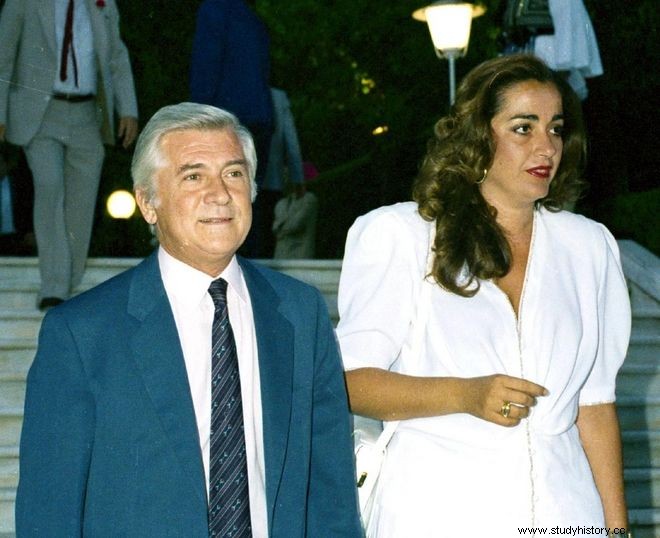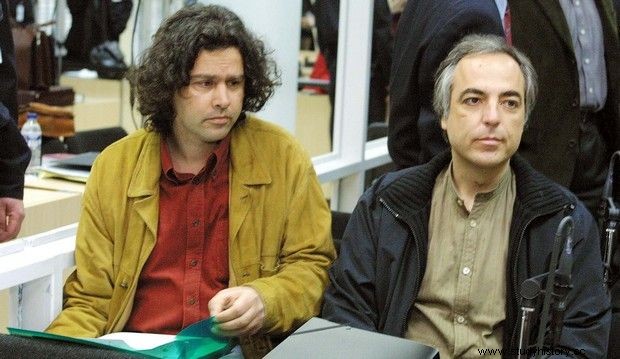On Tuesday, September 26, 1989, at 7:58 in the morning, three armed men shot with two .45 pistols and mortally wounded Pavlos Bakoyannis, member of parliament for Evrytania of the ND and son-in-law of Konstantinos Mitsotakis, at the entrance to his office on Omirou Street in Kolonaki.
The MP was transferred to "Evangelismos", where he expired an hour later.
The murder of Pavlos Bakoyannis shocked the political news of those days, which was monopolized by the start of the process for the impeachment of the politicians of the Koskotas scandal.
In his memory, Attiko Metro S.A. decided to rename the station "Evangelismos" to "Pavlos Bakoyannis". Below we remember 5 things from his life and action.
1. Action in Germany and journalism
Pavlos Bakoyannis was born on February 10 in Velota, Evrytania. His father was the village priest Kostas Bakoyannis. Due to the civil war, he studied at the high schools of Agrinio, Thermos, Karpenisi and Patras.
After graduating from high school, he studied political and economic sciences at Panteio, while at the same time serving his military service in the Coast Guard. He then completed post-graduate studies in West Germany and was awarded a PhD in Social Sciences by the University of Konstanz.
He taught at the School of Political Sciences of the University and at the School of Journalism in Munich and for ten years directed the Greek-language program of the Bavarian Radio, which was broadcast in Greece through Deutsche Welle. Due to his anti-dictatorship action during the dictatorship, he was deprived of his Greek citizenship and granted political asylum in West Germany. According to the testimony of his wife Doras Bakoyannis, in 1970 a bomb was planted in his house in Munich and as the German police had told him, the Greek secret services of the time were responsible.
During the period of the national unity government of Constantinos Karamanlis, he was deputy director general of EIRT (now ERT). In December 1974, he married Dora Mitsotakis, daughter of the politician Konstantinos Mitsotakis. The couple had two children, Alexia (b. 1976) and Kostas (b. 1978).

He then worked as a political commentator in the newspaper "To Vima" and collaborated with radio and television institutions and foreign publications. In 1982 he assumed responsibility for the publication of the weekly magazine "Ena", owned by the banker Giorgos Koskotas. He remained at the magazine as editor-in-chief until his dismissal in February 1985, when the later big fraudster began flirting with PASOK.
2. The murder
Pavlos Bakoyiannis was murdered on September 26, 1989, the day the Parliament was going to decide whether to refer Andreas Papandreou to the Special Court for the Koskotas scandal, in the context of the so-called "Cleansing" or "Dirty 89" according to others. At 7:58 in the morning, he was shot by a group of three armed men at the entrance to his office on Omirou Street in Kolonaki. He was taken seriously injured to "Evangelismos" hospital, where he died an hour later. According to his wife's testimony at the 17N trial, Pavlos Bakoyiannis had spent the night before his murder at the Synaspsis offices, so on the morning in question he told his guard not to accompany him to his office in Kolonaki.
The killers were waiting for him at the entrance. He was shot four times, both fatally.

3. The natural authors
Dimitris Koufontinas was born in Terpni, Serres. In his teens, he joined the PASOK youth group, but was expelled as he was in favor of armed struggle. In the early 80's he joined 17N, took part in the most important strikes of the organization, recruited new members and was also its treasurer.
He surrendered to the police on September 5, 2002 and while the organization had begun to disintegrate after the accident of S. Xiros. He took full political responsibility for the action of 17N and was accused of a series of murders, including N. Momferatos, Al. Athanasiadis-Bodossakis, Pavlos Bakoyannis, Kostas Peratikos. In total, he was accused of 200 crimes and was sentenced at first instance to 13 life terms and 25 years in prison, a sentence that was changed to 11 life terms and 25 years in prison at the Court of Appeal.
S. Xiros, the son of a priest, worked as a hagiographer and settled permanently in Athens in the early 90s. He joined the anti-authoritarian space, while he was allegedly recruited on November 17 by Dimitris Koufontinas. Savvas Xiros, is the man who essentially started the dismantling of 17N as the improvised explosive device exploded in his hands on June 29, 2002. He was seriously injured and still faces severe vision problems. Police operations on the organization's yachts followed, as keys and other items were found on it. He was sentenced to 5 life terms and 25 years in prison for participating in 5 murders, robberies and explosions as part of his activities as a member of 17N.
Heraklis Costaris was born in Preveza and moved to Athens for business reasons. He was arrested in 2002 in Preveza, where he was vacationing with his family. He was accused of participating in the murders.
He is accused of participating in the murders of Pavlos Bakoyannis, American Sergeant Richard Stewart and businessman Kostis Peratikos. He was sentenced to one life sentence and 23 years in prison.
4. The national reconciliation
From November 1985 to September 1989 he was a political advisor to the President of the New Democracy, Costas Mitsotakis. In June 1989, he was elected a member of parliament for the single-seat district of Evrytania. The Tzannetakis Government followed, in the formation of which he took an active role, as a negotiator between his party and the Coalition.
As a politician he was considered mild and agreeable. He considered it imperative to overcome the dividing lines, to heal the wounds of the Civil War and Division and National Reconciliation.
In the context of this belief, he worked for the success of the co-government project of the Left and the Right. For the same reasons, he was the introducer, on behalf of the ND, of the bill for the elimination of the consequences of the civil war, which was overwhelmingly voted into law in the summer of 1989.
"In the summer of 1989, Pavlos Bakoyiannis played a catalytic role in the negotiations between the ND and the Coalition for the formation of the Tzanetakis government. Whatever one's opinion on the "dirty '89", national unity was absolutely in the spirit of Bakoyiannis, who a few weeks before his assassination he proposed as a ND MP the bill to eliminate the consequences of the civil war. Why did November 17 choose to assassinate this man on September 26, 1989, the day Parliament was going to decide whether to refer him Andreas Papandreou in the Special Court for the Koskotas scandal?", wrote Stelios Kouloglou ten years after the murder of Bakoyannis.
November 17th used the following as justification: "So we decided to execute the fraudster and robber of the people Bakoyannis. This gentleman is responsible not only because he stole the first 60 million of the Line's founding capital but also for the hundreds of millions he either stole together with Koskotas' partner for the increase of of the share capital of the Line, but also for the purchase through the Line of the Bank of Crete" (excerpt from the 12-page announcement sent to "Eleftherotypia" on October 9, 1989).
5. Constantinos Mitsotakis
's historic speechThe then President of the New Democracy, Konstantinos Mitsotakis, in his speech to the parliament, visibly moved, spoke of a "political assassination" and wished it to be the last.
"It is a political assassination that is added to a long chain of murders that preceded it. It is a severe blow to the New Democracy.
And it is a severe test for me and my family. But at this time of great trial, we must all stand up. To protect the Democracy and its Institutions.
As for me, I have a wish to express. May the blood of Pavlos Bakoyannis be the last blood shed unjustly in this place".
